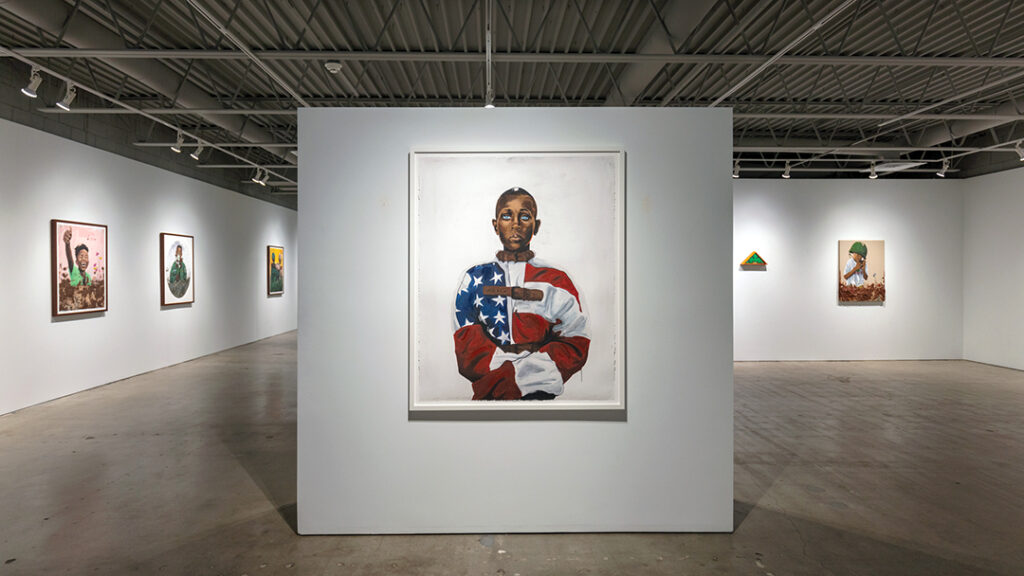Robert Moore – in his words
7/5/2023 Robert Moore is an enthralling artist, a great story, and a humbling writer. His hand-touched archival prints recount his personal struggles within the context of the historic ordeals of black manchildren desperately trying to grow up in America. His story is how art can become therapy for drug addiction and its root causes.
Robert Moore is an enthralling artist, a great story, and a humbling writer. His hand-touched archival prints recount his personal struggles within the context of the historic ordeals of black manchildren desperately trying to grow up in America. His story is how art can become therapy for drug addiction and its root causes.
His writing humbles anyone such as I who might try to comment upon it. Even Abraham Lincoln apologized for speaking at Gettysburg because that was not his story to tell. Rather than make myself a fool, Moore’s own words will illustrate the works in his show at Moberg’s “Field of Dreams: Out the Mud” which plays through July 21.
Many of Moore’s prints reveal the struggles of a manchild overwhelmed by non-nurturing ordeals of growing up, or hoping to grow up. Of his autobiographical “Messiah // Middle Child,” he writes “Skin like bronze and hair like wool. One parent of African Descent and One parent of European descent. Unsure if Jew or Gentile … ‘African American.’
“In this work, it brings a personal reference to ethnic, cultural and physical identity. Referencing an androgenous figure, in memorial of Black American soldiers (like Trayvon Martin), wearing a hood, like the robe of Jesus. Like Trayvon, the hood, just like the ‘Seamless Robe of Jesus,’ was known as the last thing worn before his crucifixion.
“An African elder once told me, you have a little African in you, you 100% African. We must love each other the same.”
“Amerikkka Made Us Crazy” presents a black child in a patriotic straight jacket. Moore writes, “The history of what America has done to Black Americans is enough to make us ‘Crazy.’ In the United States, scientific racism was used to justify slavery to appease the moral opposition to the Atlantic slave trade.
“Black men were described as having ‘primitive psychological organization,’ making them ‘uniquely fitted for bondage.’ Even at the turn of the 20th century, leading academic psychiatrists claimed that ‘negroes’ were ‘psychologically unfit’ for freedom.
“And as late as 1914, drapetomania was listed in the Practical Medical Dictionary. Furthermore, after slavery was abolished, Southern states embraced the criminal justice system as a means of racial control. ‘Black codes’ led to the imprisonment of unprecedented numbers of black men, women and children, who were returned to slavery-like conditions through forced labor and convict leasing that lasted well into the 20th century.
“Understanding the past enables new ways of addressing current implications and identified barriers, including how schizophrenia became a ‘black disease,’ why prisons emerged where hospitals once stood, and how racial disparities continue to exist in the mental health system today.”
Of “I Don’t Know What I Want to Be When I Grow Up but I Want to Be Alive,” he writes, “Coming out of high school is rough (becoming an ‘adult’). Not sure what you are going to do, especially when your options are limited. Growing up Black in America Feels like you’ve already been in war your whole life, so joining the military or a gang seems natural. Maybe even going to prison seems natural. Cuz it gives you a sense of purpose, belonging, part of a family.
“This work and the show is about the Rite of Passage being Black in America. The coming of age journey. Unsure of what to be as an adult, but forced into war your entire childhood. Born a casualty of war. Somehow, We Rise. Out The Mud.”
In “Kings Don’t Belong in Cages” Moore quotes Tupac. “Dear Mama, they sentenced me to death / today’s my final day, I’m counting every breath / I’m bitter cause I’m dying, so much I haven’t seen / I know you never dreamed, your baby would be dead at 16.”
The show includes 11 additional works, mostly with commentary by the artist. Go, see and be humbled. ♦

















